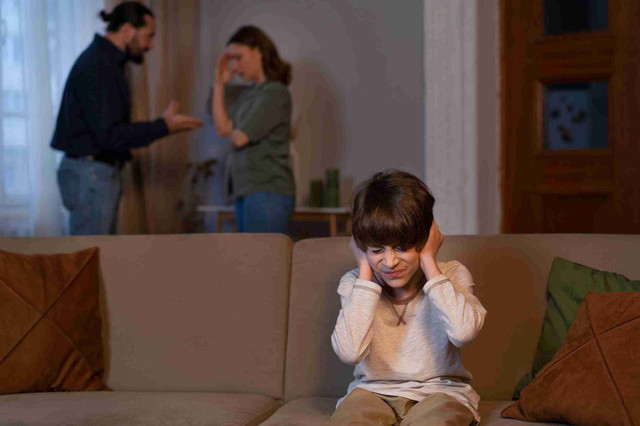Tentang KamiPedoman Media SiberKetentuan & Kebijakan PrivasiPanduan KomunitasPeringkat PenulisCara Menulis di kumparanInformasi Kerja SamaBantuanIklanKarir
2025 © PT Dynamo Media Network
Version 1.103.0
Konten dari Pengguna
Cracks in the Home: Impact and Hope for Children from Broken Homes
29 Desember 2024 13:54 WIB
·
waktu baca 4 menitTulisan dari Qumi Aisyah tidak mewakili pandangan dari redaksi kumparan
ADVERTISEMENT
Broken home is a term that refers to a family situation that is no longer intact because of divorce, household conflict, or the absence of one parent. This condition not only impacts the relationship between the couple, but also has a major influence on the development of children, emotionally, psychologically, socially, and academically.
ADVERTISEMENT
In the context of psychology, children growing up in broken homes are often in a vulnerable position. They are faced with emotional instability and situations that can hinder their mental growth. This is an important concern because the family is the main foundation for the formation of a child's personality and character.

Impact of Broken Home on Children
1. Psychological and Emotional Impact
Children who experience a broken home often face major challenges in managing their emotions.
The family is the first and primary environment that forms the basis of a child's emotional and psychological development. When families disintegrate, for example through divorce or prolonged conflict, children are often the most vulnerable. This can affect how children understand the world, build relationships and manage their emotions.
ADVERTISEMENT
a. A sense of loss: The child feels deprived of the full love and attention of both parents. This can lead to feelings of sadness, anger and confusion.
b. Low Self-Confidence: Conflict in the family may make the child feel worthless or blamed for the parents' separation.
c. Psychological Trauma: In extreme cases, children can experience trauma that affects them into adulthood. Symptoms of trauma may include nightmares, excessive anxiety, or difficulty establishing healthy relationships in the future.
2. Sosial Impact
a. Adaptation Difficulties: Children from broken homes may feel isolated or have difficulty establishing social relationships with peers.
b. Social Stigma: In some neighborhoods, children from broken homes often face stigma or differential treatment, which can worsen their self-confidence.
ADVERTISEMENT
c. Antisocial Behavior: The inability to express emotions healthily can lead to aggressive behavior, resistance to authority, or even criminal acts.
3. Academic
Family tensions often interfere with children's concentration and motivation to learn. Specific impacts include:
a. Decreased academic performance due to emotional disturb.
b. Inability to focus on schoolwork due to a mind that is constantly distracted by family conflict.
c. Absenteeism in school activities, either due to lack of support from parents or embarrassment.
4. Mental Health Disorders
a. Depression: The child feels unable to control the situation that they experience.
b. Overanxiety: Uncertainty about the family's future can make children feel constantly anxious.
c. Self-Harm: In severe cases, the child may get caught up in feelings of hopelessness that drive them to self-harm.
ADVERTISEMENT
B. Hope for Broken Home Children
Children who have experienced a broken home have a very challenging time, but they also have the opportunity to achieve a better future. Here are some hopes and efforts that can be made:
1. Support from Others
The role of adults, such as parents, family, or teachers, is very important for children. By providing love, care and understanding, children will feel supported even if their family is not complete.
2. Therapy of Counseling
Therapy or counseling can help children regulate their feelings and understand what is going on. It also helps them learn to think more positively.
3. Good Education
Education not only helps children do well in school, but also helps them develop emotionally. This is important for their more stable future.
ADVERTISEMENT
4. Learn to Socialize
Children can be invited to join activities such as sports, arts, or other groups. These activities help them gain confidence and make friends.
5. Recognizing Talents and Interests
Children need to be given the opportunity to discover what they love, such as a hobby or talent. This can help them be confident and purposeful for a better future.
Conclusion
Broken homes are a phenomenon that has a significant impact on children's lives. Despite the challenges faced, children can still grow into emotionally and socially healthy individuals if given the right support. Therefore, families, communities and educational institutions must work together to help these children facing the future.
ADVERTISEMENT
The psychological and emotional impact experienced by children from broken homes can be long-lasting if not treated appropriately. However, with enough support from parents, family and neighborhood, children can learn to manage their emotions and develop into resilient individuals. It is important for parents and society to understand that children's well-being should be the top priority in dealing with difficult family situations.

